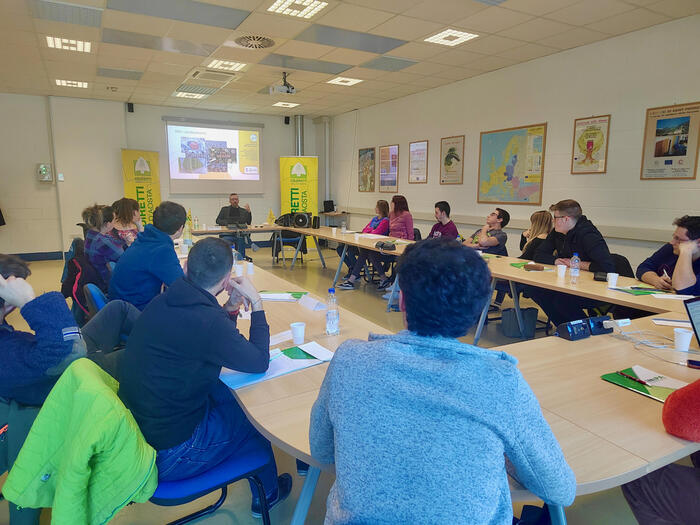There are truths that are as simple as they are correct. For example, the worse a person is trained, the lower his chances of getting a good job with a decent wage. And so it does not surprise at first glance that in Germany, about half of all low-skilled work in the low-wage sector.
But at second glance it becomes clear that this truth does not have to be irrefutable. Because in other countries, people with low education land significantly less often in the low-wage sector than in Germany.
Especially in the high-wage country Germany, low-skilled people therefore often have low incomes - and there are reasons for this. At the beginning of the millennium, Agenda 2010 massively expanded the low-wage sector. Above all, however, Germany has done less well than other states to provide education and skills to those with poor prospects.
This is the conclusion of a new study commissioned by the Bertelsmann Stiftung. The Bonn Institute for the Study of Labor (IZA) and the Berlin Institute for Empirical Social and Economic Research (INES) investigated how the situation of people with low qualifications in the labor market has developed since the mid-1980s, also in European comparison. Even the title of the summary suggests that the number of good news in the report is clear: "Low skilled in Germany - low wages, precarious conditions."
"On the credit side, the proportion of people with low qualifications in the workforce has been declining for years," says Katharina Bilaine, labor market expert at the Bertelsmann Stiftung and head of the study. In 1985, 27 percent of people between the ages of 25 and 64 in West Germany were considered low-skilled - that is, they either did not have a high school diploma or only a secondary school or secondary school diploma as the highest qualification. About 30 years later, in 2016, this share had fallen to twelve percent. In East Germany it was about at the level of the nineties, at six percent.
Another good news is that the low-skilled also benefit from the good economy and, despite technological change and digitization, have opportunities in the labor market. From 1985 to 2016, the employment rate of the low-skilled in the old federal states rose from 48 percent to 63 percent.
But then the problems begin: a system failure with far-reaching consequences for those affected. Because the question arises, what price does the extra work have for her?
"Although today, the low-skilled are employed, but often it does not pay for them," says study leader Bilaine. More and more frequently they end up in the low-wage sector - that is, they earn a gross hourly wage of no more than two-thirds of the so-called median wage. The median wage is right in the middle, if you divide the group of employees into two halves.
more on the subject
From 1990, the number of low-skilled workers working in the low-wage sector has been steadily increasing. The main reason is that "these people often end up in precarious or atypical employment," says Bilaine.
Although the proportion of low-skilled workers who have a permanent full-time job was almost constant at around 30 percent. However, an ever-larger group of low-skilled workers are also working in mini-jobs, part-time jobs, on fixed-term contracts or in temporary work (see chart). All areas in which tend to be paid worse. Only the introduction of the statutory minimum wage in January 2015 stopped the trend: in the following two years, the proportion of low-skilled workers in the low-wage sector fell again slightly.
"Low wages do not necessarily have to be the price for a high employment rate," says Bilaine. That there is another way, shows a look abroad. While the share of low-skilled low-wage workers in Germany is 50 percent, in the United Kingdom it is only 33 percent, in Denmark 25, in France 18 and in Sweden only 5 percent. "In international comparison, we are in a bad position, in Germany especially many low-skilled are in the low-wage sector," says Bilaine.
In the UK, above all, the sharp increase in the statutory minimum wage over the years since its introduction in 1999 has reduced the quota. In France too, a comparatively high minimum wage lowers the proportion of low-skilled workers with low-wage work. However, the state can cost this around 25 billion euros in wage subsidies to businesses.
The researchers of the Bertelsmann Foundation also see a higher minimum wage as a possible solution for Germany. However, they caution caution, so that negative employment effects are avoided. For sustainable and promising people, they consider the Scandinavian way of raising the qualification of people through education and further education. Because so far those in Germany who need qualification the most need, least of all.
In a survey conducted in 2018, only 4.3 percent of low-skilled workers in Germany said they had taken part in education or training over the last four weeks - in Denmark it was almost 16 percent and in Sweden 21 percent. In both countries, the state is investing heavily in active labor market policies, training and in-service education, especially for the low-skilled.
The National Continuing Education Strategy, recently adopted by the Federal Government, is therefore a step in the right direction, says Bilaine, but now concrete measures have to follow. This also means that the low-skilled need to get out of low-paid mini-jobs and precarious employment. "Further education is usually linked to permanent full-time employment," says the researcher. And the maintenance and development of competences are in turn the prerequisite for better incomes.
"More equality in skills allows more equal wages," says Bilaine. Germany is still far away from both.







